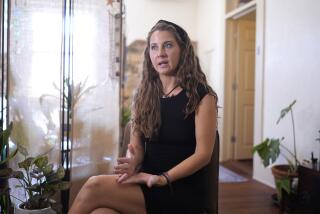Girl Declared Brain Dead Has Premature Baby by Cesarean
SAN BERNARDINO — A brain-dead teen-ager sustained by life-support systems since March because of a thorny legal dispute over the fetus she was carrying delivered the baby by Cesarean section Thursday.
Tanya Marie Rivera, 15, and her daughter were in very critical condition after the procedure, officials at San Bernardino County Medical Center said.
Meanwhile, Tanya’s parents, George and Alice Rivera of San Bernardino, were wrestling late Thursday with whether to remove their daughter from the machines that have kept her alive since she was shot in the head and declared brain dead nearly two months ago.
“They’ve been here all night,” said nursing supervisor Joy Flint. “They go from the girl’s side to the baby and back again. They’re trying to decide what to do.”
Hospital officials have said there is no hope for Tanya. The prognosis for her newborn, who is having trouble breathing because of poorly formed lungs, is poor, Flint said.
Tanya, an attractive girl with shoulder-length brown hair, has been hooked to artificial support systems since she was shot once in the head March 15, allegedly by her boyfriend. The 16-year-old youth, who is the father of the baby and has not been identified, has been ordered to stand trial in Los Angeles in an unrelated homicide. He has not been charged in Tanya’s case.
The Riveras, who are divorced, initially had requested that their comatose daughter be allowed to die. Hospital officials refused, and the medical center’s director won a court-ordered guardianship of Tanya over her parents’ objections.
In court filings, San Bernardino County officials sought to block termination of life sustaining care for the girl, citing rights of her fetus. They argued in court documents that termination of care for Tanya “would be tantamount to aborting the fetus.”
The county attorneys argued that Tanya’s wishes were unknown, the fetus had a heartbeat and the law governing such cases is unclear.
Hospital officials said they were reluctant to disconnect life-support systems because they were unsure of their legal liability.
Before long, the case attracted the interest of abortion foes. Protests came from the Right to Life League of Southern California as well as a statewide organization of physicians opposing abortion, who wrote a letter critical of the Riveras and urged the court to appoint a guardian for Tanya.
The Roman Catholic Diocese of San Bernardino County also stepped in, advocating that the fetus be saved and threatening to intervene legally in the dispute.
Began Contractions
A San Bernardino Superior Court judge was scheduled to hear arguments in the case Monday. But on Wednesday morning, Tanya began experiencing uterine contractions. Medication stopped the contractions temporarily, but they resumed late Wednesday night.
By morning, the fetus was showing signs of distress and the decision to perform a Cesarean section was made, said Charles Jervis, director of the medical center. Tanya was taken to the operating room at 10 a.m. and the baby was delivered 25 minutes later.
The infant, who weighed about five pounds and was seven weeks premature, is in the neonatal intensive care unit. She suffers from hyaline membrane disease, a deficiency of the chemical that normally coats the sacks in the infant’s lungs, and appears to have brain damage likely related to bleeding or infection during gestation.
Although unusual, the San Bernardino case is not the first of its kind.
In July, 1986, a baby was delivered in Santa Clara by doctors who had sustained the brain-dead mother for nearly eight weeks in order to allow the fetus to develop. The parents of the mother, Marie Odette Henderson, had wanted to terminate artificial support, but the father went to court and won an order protecting the fetus. He was later granted custody of the infant.
In a related court case in February, New York state’s highest court denied an appeal by anti-abortion activists seeking to prevent a Long Island man from having an abortion performed on his comatose wife.
More to Read
Sign up for Essential California
The most important California stories and recommendations in your inbox every morning.
You may occasionally receive promotional content from the Los Angeles Times.










